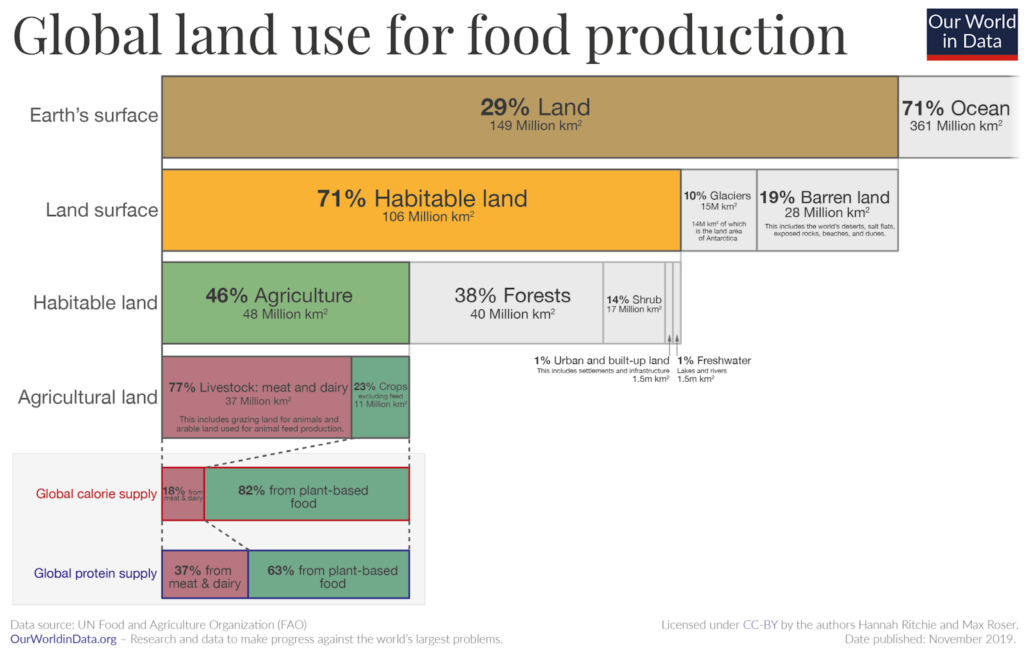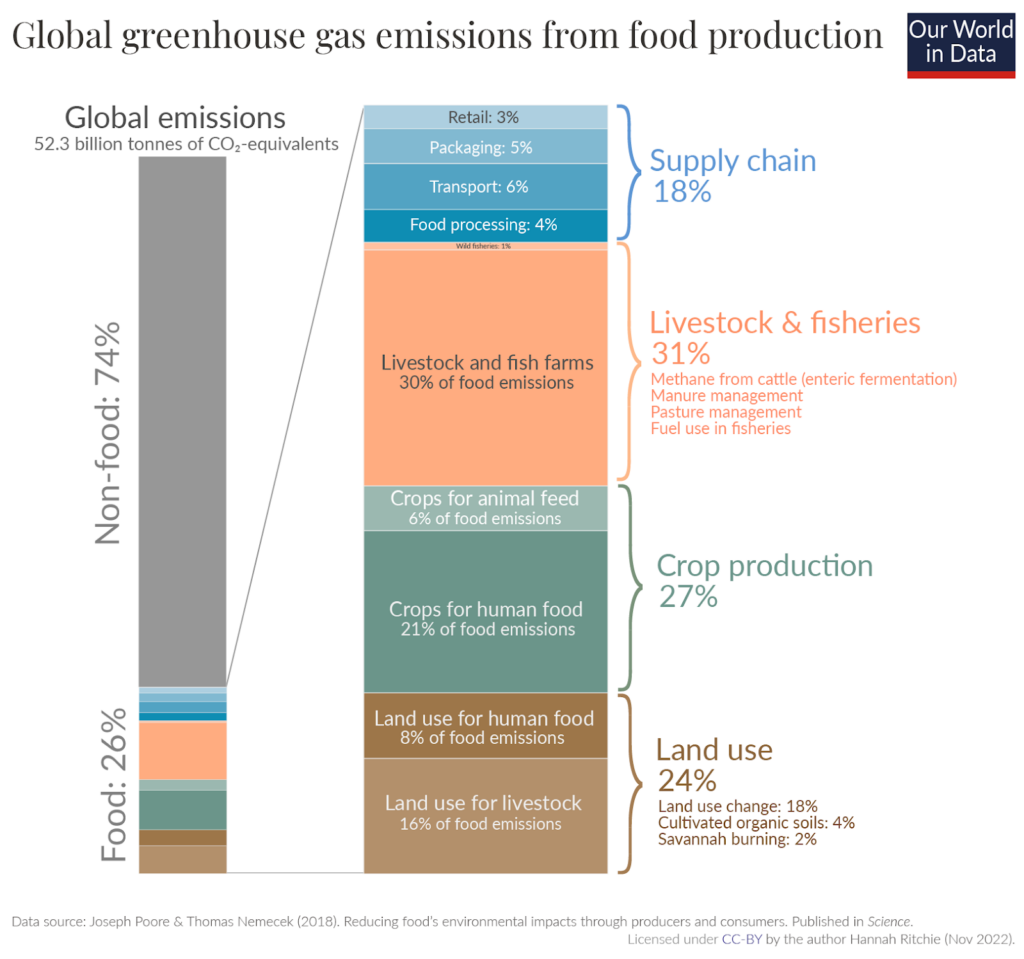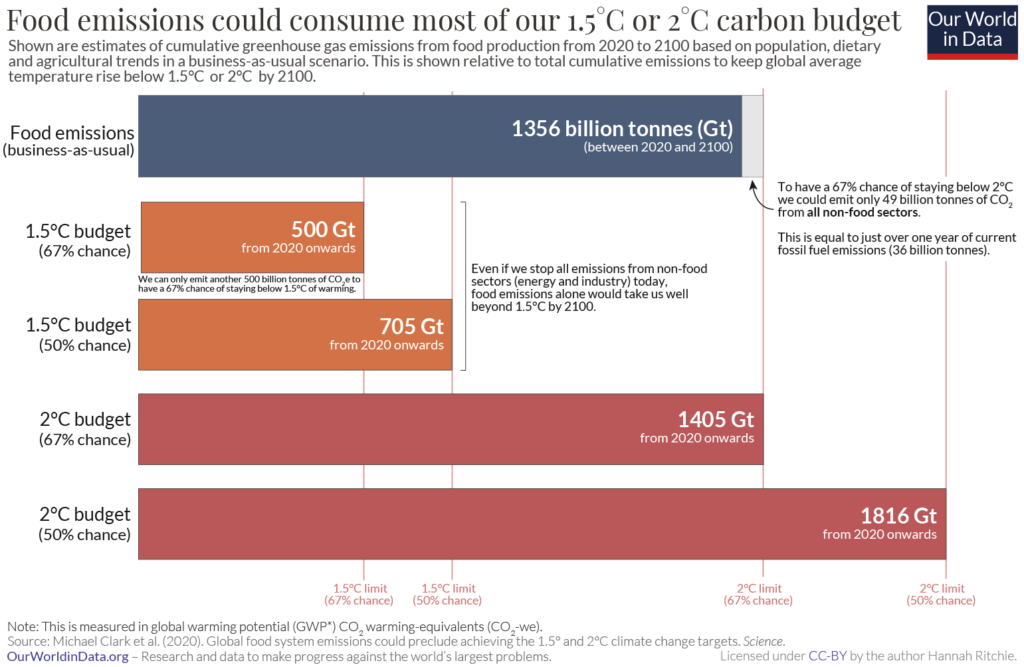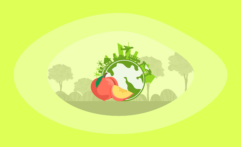Is Eating Avocados Ethical & Sustainable? Here Are the Facts
Affiliate Disclosure
Hey fellow impactful ninja ?
You may have noticed that Impactful Ninja is all about providing helpful information to make a positive impact on the world and society. And that we love to link back to where we found all the information for each of our posts.
Most of these links are informational-based for you to check out their primary sources with one click.
But some of these links are so-called "affiliate links" to products that we recommend.
Why do we add these product links?
First and foremost, because we believe that they add value to you. For example, when we wrote a post about the environmental impact of long showers, we came across an EPA recommendation to use WaterSense showerheads. So we linked to where you can find them. Or, for many of our posts, we also link to our favorite books on that topic so that you can get a much more holistic overview than one single blog post could provide.
And when there is an affiliate program for these products, we sign up for it. For example, as Amazon Associates, we earn from qualifying purchases.
What do these affiliate links mean for you?
First, and most importantly, we still only recommend products that we believe add value for you.
When you buy something through one of our affiliate links, we may earn a small commission - but at no additional costs to you.
And when you buy something through a link that is not an affiliate link, we won’t receive any commission but we’ll still be happy to have helped you.
What do these affiliate links mean for us?
When we find products that we believe add value to you and the seller has an affiliate program, we sign up for it.
When you buy something through one of our affiliate links, we may earn a small commission (at no extra costs to you).
And at this point in time, all money is reinvested in sharing the most helpful content with you. This includes all operating costs for running this site and the content creation itself.
What does this mean for me personally?
You may have noticed by the way Impactful Ninja is operated that money is not the driving factor behind it. It is a passion project of mine and I love to share helpful information with you to make a positive impact on the world and society. However, it's a project in that I invest a lot of time and also quite some money.
Eventually, my dream is to one day turn this passion project into my full-time job and provide even more helpful information. But that's still a long time to go.
Stay impactful,
Avocados are a delicious and trendy fruit. They have exploded in popularity over the past few decades, with their US consumption increasing by around 500% between 1985 and 2021. Avocados also have lots of health benefits, including generous helpings of vitamins C and E, as well as magnesium and potassium. They are a classic staple on toast, in salads, and of course, as guacamole. But there can also be many unethical and unsustainable aspects of avocado farming. So we had to ask: Is eating avocados ethical and sustainable?
Eating avocados is fairly unethical. Cartels have infiltrated and corrupted much of the avocado trade in Mexico, leading to instances of violence, child labor, and forced labor. However, in many parts of the industry, Mexican avocado workers still make five times the minimum wage.
Eating avocados is very unsustainable. They have an extremely high carbon footprint, contribute to wildlife loss and deforestation, and use plastic packaging. However, they contribute minimally to environmental damage when it comes to pesticide use.
In this article, we will assess both the ethical and sustainability practices of the avocado industry. Through these two lenses, you will be able to gain in-depth knowledge of the overall impacts of the avocados that you eat!
Here’s How We Assessed the Ethics & Sustainability of Avocados
The Sustainability Assessment of Food and Agriculture Systems (SAFA) is one of the ways we measure the externalities of our actions, like the consumption of avocados. It is a holistic assessment based on the potential impact of food and agriculture operations on the environment and people. Those impacts are changes in our environment that can have adverse effects on the air, land, water, fish, and wildlife or the inhabitants of the ecosystem.
“Ethical: The discipline concerned with what is morally good and bad and morally right and wrong”
Encyclopedia Britannica
Ethics and sustainability are closely interconnected concepts that share a common objective: the well-being and preservation of our planet, including all its life and future generations.
“Sustainable: The ability to be maintained at a certain rate or level | Avoidance of the depletion of natural resources in order to maintain an ecological balance”
Oxford Dictionary
Basically, all goods and services you buy—including avocados—leave an impact on people, animals, and our environment. And when it comes to food in general—and avocados in specific—the following are key factors for their ethics and sustainability:
- Social and economic conditions: The ethics of food crucially depends on the social and economic conditions of the farmers who grow them. Especially on fair labor practices, including fair wages and safe working conditions.
- Seasonality: Eating seasonally is a lever of sustainability. The two key reasons are that seasonal food is more likely grown in their “natural growing season” without using greenhouses, and also more likely to be grown locally.
- Land requirements: Large parts of the world that were once covered by forests and wildlands are now used for agriculture. 10 million hectares of forest are destroyed annually and 50% of the world’s habitable land is now used for agriculture. This loss of natural habitat has been the main driver for reducing the world’s biodiversity.
- Water footprint: 70% of global freshwater is now used for agricultural purposes. By assessing the water footprint of a particular food, we can determine how our limited freshwater resources are being consumed and polluted.
- Pesticide and fertilizer usage: Pesticides and fertilizers provide a range of agricultural benefits. However, numerous studies link pesticides and fertilizers to serious effects on human health, along with disruptions to vital ecosystems and the spread of aquatic dead zones.
- Carbon footprint: The carbon footprint is one of the ways we measure the effects of our human-induced global climate change. Today, food production accounts for over a quarter (26%) of global greenhouse gas emissions.
- Waste generation: Food and its packaging account for almost 45% of the materials landfilled in the US alone. And packaging sent to landfills, especially when made from plastics, does not degrade quickly or, in some cases, at all.
To understand the overall environmental impact of avocados, we must assess each of their key factors. This Sustainability Assessment of Food and Agriculture Systems (SAFA) is a tool developed for assessing the impact of food and agriculture operations on the environment and people. And this tool helps us to evaluate whether eating avocados is ethical & sustainable.
Here’s How Ethical & Sustainable Eating Avocados Is
The overall ethics & sustainability of avocados is very low. This is mainly because the Mexican avocado industry is plagued by cartel corruption. In terms of sustainability, they have a very high carbon footprint, contribute to deforestation, and use plastic packaging. Compared to other fruits, they are considerably unsustainable.
Avocados have some positive qualities when it comes to ethics and sustainability. For example, Mexican avocado farmers tend to make much more than the minimum wage, and avocados also have very low pesticide usage. However, despite these things, they are still somewhat unethical and very unsustainable overall.
So, let’s have a look at the ethics & sustainability impact of each key factor of avocados!
| Key Assessment Factors | Ethics & Sustainability |
| Social and economic conditions of avocados | Avocados’ social and economic conditions are fairly bad. Although avocado pickers make more than average, cartels have compromised the ethics of the industry. This has opened the door for violence, child labor, and forced labor. |
| Seasonality of avocados | Avocados’ seasonality is from January to March, though they can still grow year-round. They are imported from Mexico regardless of season, and so they maintain lower sustainability, no matter the time of year because of continuous transportation. |
| Land requirements for avocados | Avocados have a low land yield, contribute to Mexico’s deforestation, and are grown in monocultures. Thus, they are very unsustainable at this stage. |
| Water footprint of avocados | Avocados have a moderate water footprint of about 50 inches of water per year. They require a significant amount of irrigation, yet need very little water to clear up pesticide runoff. |
| Agrochemical usage for avocados | Avocado agrochemical use is moderate. They use few pesticides, but they also use harmful nitrogen fertilizer. |
| Carbon footprint of avocados | Avocados have an extremely high carbon footprint of around 0.85kg (1.9lbs) of CO2e per pound of avocados. The main reasons for this are transportation emissions, deforestation due to high land use, waste management, and significant water consumption. |
| Waste generation of avocados | Avocados waste generation is fairly high. Most of their waste, both organic and packaging, ends up in landfills. |
These are the overall summaries, but there is a lot more to the story. In the next few sections, we will dive deeper into each stage to illustrate to you all the important aspects of avocados’ ethics & sustainability.
How Ethical & Sustainable Are the Social and Economic Conditions for Avocados
Avocados’ social and economic conditions are fairly bad. Although avocado pickers make more than average, cartels have compromised the ethics of the industry. This has opened the door for violence, child labor, and forced labor.
Everything we consume was made or harvested by somebody. In past centuries, this was often someone who lived in your community and who you might have even known personally. But through the rise of globalized distribution systems, we have become increasingly alienated from the people who make our food. This leaves a lot of room for exploitation and abuse, both of which are rampant in the food industry. Here, we will look at how the avocado industry fares in relation to these ethical questions.
How ethical & sustainable are the social and economic conditions of growing avocados?
- Are farmers paid fair wages to grow avocados: Avocado farmers in Mexico actually make decent wages. Mexican avocado farmers can make up to $60 per day, compared to Mexico’s minimum wage of around $11 per day. These high wages mean that avocado farming is a highly lucrative job role within Mexico.
- How safe are the working conditions to grow avocados: The main hazards that avocado farmers face in the industry are contact with dangerous machinery, biohazards, such as fungus, and chemicals. These are common dangers in agriculture and aren’t particularly unique to avocado farming.
- Are there reports of child or forced labor to grow avocados: There have been some minor reports of child and forced labor within the avocado industry. These are mainly associated with illegal cartel operations, and not so much in the legitimate avocado industry. However, as the lines between these continue to blur, there is a small risk that your supermarket avocados were picked using child or forced labor.
- What is the wider economic impact on the communities that grow avocados: Cartel involvement is the biggest problem in the Mexican avocado industry. Since the business of avocado production and exportation is so lucrative, many cartels have seized control of farms, sometimes even charging them tax premiums for “protection” and manipulating aspects of their operation to maximize profit. With organized crime comes violence and unrest, which can severely impact surrounding communities in the state of Michoacan.
In short, cartels’ involvement in the Mexican avocado industry compromises their ethics significantly. Therefore, despite their higher wages, avocado farming in Mexico can be very unethical.
How Ethical & Sustainable Are the Seasonality for Avocados
Avocados’ seasonality is from January to March, though they can still grow year-round. They are imported from Mexico regardless of season, and so they maintain lower sustainability, no matter the time of year because of continuous transportation.
Every fruit has a natural season in which they grow, usually lasting a couple of months, which can range depending on the region. However, international demand for every kind of fruit is year-round. This demand is often met by importing fruits from tropical places which can grow year-round, or by growing them in greenhouses. Both of these methods use more resources and are thus less sustainable than conventional farming. Here, we will look at how the avocado industry accommodates year-round demand.
How ethical & sustainable is it to grow avocados in-season vs out-of-season?
- When is the natural season for growing and harvesting avocados: Avocados are at their best in the winter from January to March. However, they do grow year-round in Mexico.
- How are avocados naturally grown in-season: In-season avocados are mainly grown in Mexico. They grow on trees and take around 6–7 months to mature.
- How are avocados grown out-of-season: Avocados don’t have strong seasonality, and so their out-of-season growth is much the same as their in-season growth. They are still grown in Mexico at this stage.
In short, the fact that avocados don’t have strong seasonality and are mainly grown in Mexico year-round means that their sustainability is moderately low year-round.
How Ethical & Sustainable Are the Land Requirements for Avocados
Avocados have a low land yield, contribute to Mexico’s deforestation, and are grown in monocultures. Thus, they are very unsustainable at this stage.

The growth stage has a major impact on fruits’ sustainability. The amount of land used, especially in relation to its expansion, the method with which they are grown, and their effect on surrounding land and wildlife are all important factors. In this section, we will look at the ways in which avocados’ land usage affects their sustainability.
How ethical & sustainable are the land requirements for growing avocados?
- What is the land usage of avocados: Avocados yield around 7–13 tons per hectare. This is on the lower end of yields for fruit, which means avocados will need more resources per pound to grow. For example, bananas yield around 100 tons per hectare.
- Where and how are avocados grown: Avocados are grown on trees. Trees have natural carbon sequestration properties and so some of avocados’ environmental impact is offset by this. However, avocado trees are also grown in monocultures. Monocultures are unsustainable as they reduce biodiversity and can harm soil microbes.
- How does the growing of avocados affect soil fertility and erosion: Avocados contribute significantly to soil erosion. They have been found to produce very unsustainable levels of erosion in certain soils.
- How does the avocado industry affect the loss of habitable land: With the high number of avocados produced every year, a lot of land is used to grow them. An average of 1,700 acres are cleared for avocado use every year. Much of this deforestation in Mexico is achieved through a loophole that allows agriculture to take over burned forests. Corporations will intentionally burn forests to bypass deforestation laws and grow avocados.
- How does the avocado industry affect wildlife and biodiversity: Avocados’ use of monoculture planting means that their vast farms negatively affect biodiversity. Wildlife that lives in previously biodiverse regions will have little to thrive on in a monoculture environment. For example, deforestation has caused longer, more severe hot weather spells which have affected the migration patterns of the endangered Monarch butterfly.
In short, the avocado industry’s use of monoculture farming and deforestation, as well as avocados’ tendency to erode soil means that they are very unsustainable at this stage.
How Ethical & Sustainable Is the Water Footprint of Avocados
Avocados have a moderate water footprint of about 50 inches of water per year. They require a significant amount of irrigation, yet need very little water to clear up pesticide runoff.
Water usage is one of the most important factors in a fruit’s sustainability. Practices like irrigation use significant resources and can cause pollution, and as such, factors like the amount of water used, where it is sourced, as well as the way they affect the water sources around them, are all important. Here, we will look at these different angles of avocados’ water footprint.
How ethical & sustainable is the water footprint of growing avocados?
- What is the overall water usage of avocados: Avocado trees need around 50 inches of water per year. This works out to be around 15 gallons of water per fruit over the course of its lifetime. This is a fairly average water requirement among fruits.
- What is the green water footprint of avocados: The green water footprint is the amount of water from precipitation stored in the soil and used by plants for growth. Most avocados consumed in the US are grown in Mexico. Mexico gets around 28 inches of rain per year. This means that just over half of avocados’ 50 inch per year requirement is covered by rainfall. As a result, their green water footprint is fairly high.
- What is the blue water footprint of avocados: The blue water footprint is the amount of water sourced from surface (such as rivers or lakes) or groundwater resources. Since only 28 of the 50 inches per year required for avocado trees come from rainfall, the remaining 22 inches need to come from irrigation. Irrigation has a negative impact on the environment, with a high carbon footprint and significant modification of groundwater balance. Thus, their blue water footprint is fairly high.
- What is the gray water footprint of avocados: The gray water footprint is the amount of freshwater required to clean up water pollution to meet certain quality standards. Essentially, it’s the amount of water needed to make polluted water clean enough to be safe and healthy for humans and the environment. Avocados have very low pesticide use and so their gray water footprint is low.
- How does the avocado industry affect freshwater and ocean pollution: Avocados have low agrochemical use and so they don’t affect local water sources in this way. However, the fact that they use plastic packaging means that they can have a severe effect on ocean life.
In short, avocados’ fairly high irrigation requirements, as well as their use of plastic packaging, means their water use is fairly unsustainable.
How Ethical & Sustainable Is the Agrochemical Usage for Avocados
Avocado agrochemical use is moderate. They use few pesticides, but they also use harmful nitrogen fertilizer.
Pesticides and fertilizers are agrochemicals that are very unsustainable and damaging to ecosystems. This is because they require resources to create and can easily run off into groundwater and soil systems. Here, we will look at how sustainable avocados’ pesticide and fertilizer rates really are.
How ethical & sustainable is the agrochemical usage of growing avocados?
- What is the pesticide usage of avocados: Avocados were rated first on a list of foods with the lowest pesticides. This means that the unsustainable effects of pesticides, such as groundwater and wildlife disruption, are very low for avocados.
- What is the fertilizer usage of avocados: Avocados typically need to be fertilized with nitrogen. Nitrogen has been tied to significant pollution. Therefore, their fertilizer usage is very unsustainable.
- Are there any known issues connected to the agrochemical usage for avocados: Avocados’ use of nitrogen fertilizers has significant issues. Namely, these fertilizers have high carbon emissions and can affect groundwater sources.
In short, the fact that avocados use nitrogen fertilizer means that their agrochemical usage is moderately unsustainable, despite their low pesticide use.
How Ethical & Sustainable Is the Carbon Footprint of Avocados
Avocados have an extremely high carbon footprint of around 0.85kg (1.9lbs) of CO2e per pound of avocados. The main reasons for this are transportation emissions, deforestation due to high land use, waste management, and significant water consumption.

Carbon footprint is one aspect of the overall sustainability of a fruit. It essentially measures how much carbon or other greenhouse gasses the production of fruits emits into the atmosphere. Emissions from product manufacturing, irrigation, transportation fuel, and landfills all add up to create the overall carbon footprint of a fruit. Let’s see how the carbon footprint of avocados contributes to their overall sustainability.
How ethical & sustainable is the carbon footprint of avocados?
- What is the overall carbon footprint of avocados: The overall carbon footprint of avocados is around 0.85 kg (1.9 lbs) of CO2e per pound of avocados. This is one of the highest carbon footprints amongst fruits.
- What are the main contributors to the carbon footprint of avocados: The main contributing factors to avocados’ high carbon footprint are their high transportation distances, high water use, and mismanagement of waste.
- Which life-cycle stage of avocados has the highest carbon footprint: The life cycle stage with the highest impact on avocados environmental impact is transportation. This is because most avocados come from Mexico and are transported to the US in refrigerated trucks.
In short, avocados’ use of refrigerated transportation, high irrigation, and plastic packaging means that they have an exceptionally high carbon footprint.
How Ethical & Sustainable Is the Waste Generation of Avocados
Avocados waste generation is fairly high. Most of their waste, both organic and packaging, ends up in landfills.
When fruit waste, either in the form of packaging or organic materials, is disposed of, it can cause a lot of problems. Whether it’s damaging wildlife, getting into oceans, emitting methane, or dissolving into microplastics that contaminate groundwater, all these materials have their part to play. The sheer amount of waste we produce is reaching a crisis point and won’t be able to continue much longer. In this section, we will look at how sustainable avocados’ waste generation is.
How ethical & sustainable is the waste generation of avocados?
- What is the packaging of avocados: Avocados are mainly packaged using cardboard and plastic. Plastic is very unsustainable. For example, it negatively affects ocean life, emits greenhouse gasses in its creation, and creates toxic microplastics that get into groundwater and food. Cardboard, though better than plastic, still contributes to deforestation which is very unsustainable.
- How is the packaging of avocados disposed of: Both cardboard and plastic can be recycled, but their recycling rates vary. On the one hand, cardboard has a very high recycling rate of 89%. Whereas, plastic has a recycling rate of around 9%. When plastic and cardboard are not recycled, they end up in landfills. Landfills have many unsustainable components, including carbon emissions, soil pollution, and damage to wildlife. So, the plastic components of avocado packaging will be much less sustainable than cardboard in their disposal.
- How are avocados disposed of: Avocados have pits and peels that aren’t eaten. These can technically be composted, but composting rates are generally low amongst food waste, at around 4%. Therefore, most avocado waste ends up in landfills. Besides the general adverse environmental effects of landfills, food waste has a particularly negative effect on the environment when put into landfills. This is because food waste releases methane, a harmful greenhouse gas.
In short, avocados’ use of plastic packaging and their low composting rates make for a very unsustainable fruit waste-wise.
What Have Been Historical Ethics & Sustainability Issues Connected to the Avocado Industry
Avocados have partaken in some farming practices that have significantly harmed the environment and people over the years. These include labor exploitation in Kenya, the destruction of Mexican forests, damage to aquatic life from plastic, and habitat loss.
All fruits have had a complex road toward global distribution. They originate in one part of the world and often travel far to end up in your local supermarket. From farm to table, some of our favorite fruits have racked up some serious damage along the way. Whether it’s exploiting labor, deforestation to meet demand, water pollution, or disruption of wildlife, most fruits have left a path of destruction. Let’s see how avocados have fared throughout history.
What have been the key ethical & sustainable issues of the avocado industry?
- Has labor been exploited because of avocados production: The Kenyan avocado industry has come under fire recently for human rights violations. Between 2009 and 2020, there were numerous reports of physical violence and intimidation on Kenyan avocado farms. These allegations show that there is room for exploitation within the avocado industry.
- How much land has been lost because of avocados production: The US opened their borders to Mexican avocados in 1997, which greatly increased demand for the fruit. Mexico also changed land laws in 1992, allowing for more agriculture. Over the next 16 years, they lost over a third of their forests to agricultural production.
- Which wildlife species have been negatively impacted or displaced because of avocados production: Many Mexican species have experienced habitat loss because of avocado farming’s deforestation. For example, jaguars became endangered partially due to agricultural deforestation in Mexico. Habitat loss remains the leading cause of endangered animals worldwide.
- Have water sources and soil been contaminated because of avocados production: Nitrogen fertilizers used in avocado farming have harmed soil and groundwater. Plastic is also used in avocado packaging, which is a big contributor to water pollution.
In short, the avocado industry has been accused of several unethical and unsustainable practices, including deforestation, species loss, and violence against workers.
How Can You Reduce Your Environmental Impact and Offset Your Personal Carbon Footprint
There are a few things you can do to make your avocado consumption more ethical and sustainable, while still enjoying them. You can also consider offsetting your personal and avocado-related carbon emissions, which work to remove carbon emissions elsewhere that are then attributed to you. Here, we will walk you through how to accomplish both of these things.
How Can You Shop for Avocados More Ethically & Sustainably
In this section, we give you a short list of ways you can consume avocados in a more sustainable way. This list is designed to target the most unsustainable parts of avocados’ life-cycle:
- Buy fair-trade avocados: Although Mexican avocados do have issues with cartels, experts say that boycotting Mexico’s avocado industry isn’t helpful. One way you can try to go about heightening your avocado ethics is to support fair-trade avocados instead.
- Buy unpackaged avocados: A major factor in the sustainability of an avocado is the packaging. If you buy avocados loose, without any plastic, styrofoam, or cardboard, then your overall waste will be much lower, thus reducing the amount of harmful waste in landfills.
- Recycle and compost avocado waste: If you do buy packaged avocados, try to recycle any packaging to avoid contributing to landfills. You can also compost the pits and skins so they don’t end up in landfills either. If your city doesn’t have a municipal composting service, consider creating one of your own!
Following some of these methods can really help you to make your avocado-eating more sustainable. None of these will completely eradicate the negative impacts, since there are always effects that may be outside of your control. But some reduction is always better than nothing!
Which Organizations Can You Support to Help Promote Ethics & Sustainability
While avocado production engages in some very unsustainable practices, there are also some organizations that help you change the parts of these processes that would otherwise be outside of your control. These organizations are working hard to prevent and reverse damage to the environment caused by industries like avocado agriculture, towards a more sustainable future.
In the table below are some of the best charities that work in the areas where avocado production are very unsustainable—and beyond:
Though it is helpful to boost the sustainability of your personal avocado consumption, supporting these organizations takes your positive impact a step further. You will be reaching far beyond your own consumption impacts and helping to build a better world for everyone!
How Can You Offset Your Personal Carbon Footprint
The carbon footprint is a key part of how sustainable we live. And it is one of the ways we measure the effects of our human-induced global climate change. Yes, even from eating avocados!
“Carbon footprint: the amount of greenhouse gasses and specifically carbon dioxide emitted by something (such as a person’s activities or a product’s manufacture and transport) during a given period”
Merriam Webster
Basically, it is the amount of carbon emitted by you as an individual or an organization providing you with goods and services – including avocados:
- This includes GHG emissions from producing the products that we use and foods that we eat (e.g., power plants, factories or farms, and landfills)
- GHG emissions from fuel that we burn directly or indirectly (e.g., logistics and transportation, cooling or heating facilities),
- as well as the GHG emissions attributed to how we consume these products and foods.

Carbon offsets are reductions in carbon emissions that are used to compensate for carbon emissions occurring elsewhere – for example for the carbon emissions that are associated with avocados. They are measured in tons of CO2 equivalents and are bought and sold through international brokers, online retailers, and trading platforms on what is known as the global carbon offset market.
“Carbon Offset: a way for a company or person to reduce the level of carbon dioxide for which they are responsible by paying money to a company that works to reduce the total amount produced in the world, for example by planting trees”
Oxford Dictionary
In terms of avocados – and indeed all food types – there will always be a carbon footprint, because of the resources it takes to get your food from farms to the place where you’ll eventually eat them. And while there are ways to reduce your carbon footprint when shopping for avocados, carbon offsets would be a way to reduce your CO2e emissions all the way down to net zero (or even to become climate positive).
However, when you purchase carbon offsets, it’s important that they actually make a difference in offsetting (aka reducing) total carbon emissions. To achieve that, the following are key criteria:
- Carbon offset projects have to be effective (different projects have different effectiveness rates)
- Carbon offset projects have to be additional
- Carbon offset projects have to be permanent
- The claims from carbon offset projects have to be verifiable
To find the best carbon offsets for you personally, check out our full guide on the best carbon offsets for individuals, where you’ll also learn more about how these carbon offset projects work, what their respective offsetting costs are, and what your best way would be to offset your own carbon emissions.
Final Thoughts
Avocados are certainly not the most sustainable fruit, nor the most ethical. The Mexican avocado industry is complicated; on the one hand, workers are offered competitive wages. However, on the other hand, they are run by cartels that escalate violence. On the sustainability side, the avocado industry perpetuates deforestation, carbon emissions, and plastic waste, making them very unsustainable. However, there are several ways in which you can improve your avocado consumptions’ ethics and sustainability, such as composting effectively or supporting sustainability and ethical organizations to tackle the bigger issues!
Stay impactful,

Sources
- Statistica: Average Avocado Consumption in the US
- Medical News: 12 Health Benefits of Avocado
- Cookie and Kate: Avocado Toast Recipe
- Cooking Classy: Avocado Salad
- Simply Recipes: Perfect Guacamole
- Food and Agriculture Organization of the United Nations: SAFA (Sustainability Assessment of Food and Agriculture systems) Guidelines
- Food Ethics Council: What is food ethics?
- The Fair Labor Association: Agriculture Standards
- MDPI Sustainability: Eating in Season—A Lever of Sustainability? An Interview Study on the Social Perception of Seasonal Consumption
- MDPI Foods: The Role of Local Seasonal Foods in Enhancing Sustainable Food Consumption: A Systematic Literature Review
- UN Environment Programme: Environmental Impact Assessment and Strategic Environmental Assessment: Towards an Integrated Approach
- Our World in Data: The environmental impacts of food and agriculture
- Our World in Data: Global land use for food production
- World Health Organization: Preventing disease through healthy environments: a global assessment of the burden of disease from environmental risks
- ScienceDirect (Biological Conservation): Worldwide decline of the entomofauna: A review of its drivers
- EPA: The Sources and Solutions: Agriculture
- EPA: Reducing Food Waste and Packaging
- FoodPrint: The Environmental Impact of Food Packaging
- Wikifarmer: Avocado Tree Water Requirements
- Impactful Ninja: What is the Carbon Footprint of Avocados
- Sustainable Food Trust: The Expansion of Avocado Farming
- SHRM: Mexico Boosts Minimum Wage by 20%
- Ag Health: Avocado Growing and Packing Safety Guide
- The Guardian: Are Mexican Avocados the World’s New Conflict Commodity
- NPR: Mexican Drug Cartels Are Getting Into the Avocado and Lime Business
- Weaver Street Market: Peak Season for Avocados
- USDA: Imports Play Dominant Role in US Avocado Imports
- Colorado State: Avocados
- Wikifarmer: Avocado Harvest Yield Per Hectare
- Impactful Ninja: What is the Carbon Footprint of Bananas
- Good Housekeeping: How to Grow an Avocado Tree
- Woodland Trust: How Trees Capture and Store Carbon
- You Matter: Avocado Sustainability
- EOS: Monoculture Farming Explained
- Springer: Soil Erosion in Avocado Farms
- Alva Water: Are Avocados Green?
- WeForum: The “Green Gold” Causing Environmental Havoc
- RHS: Avocados
- Colostate: Avocados
- Impactful Ninja: What is the Carbon Footprint of Strawberries
- Wikifarmer: Avocado Tree Water Requirements
- Fair Observer: Green Gold: The Curse of the Avocado
- Water Footprint: What is a Water Footprint?
- USDA: Imports Play a Dominant Role in US Demand for Avocados
- Climate Knowledge Portal: Mexico
- Science Direct: Energy and Carbon Footprint of Irrigation
- World Atlas: What is the Environmental Impact of Irrigation
- Healthline: The Clean Fifteen
- Wikifarmer: Avocado Harvest
- Biological Diversity: The Plastic Production Problem
- USGS: Pesticides in Groundwater
- GOV.BC: Environmental Protection and Pesticides
- UCANR: Managing Pests in Gardens
- Mitsui: Reducing the Environmental Impact of Garden Fertilizers
- Our World in Data: Global greenhouse gas emissions from food production
- Estimating the Water and Carbon Footprint of Growing Avocados
- USDA: Protecting Perishable Foods
- Wikifarmer: Avocado Harvest Yield Per Hectare
- Biological Diversity: The Plastic-Production Problem
- Teorra: What is the Carbon Footprint of Packaging
- UNEP: Plastic Planet: How Tiny Plastic Particles are Polluting Our Soil
- TRVST: Environmental Impact of Cardboard
- Also Known As: 12 Interesting Facts About Packaging
- SL Recycling Ltd: What Are the Negative Effects of Landfill
- EPA: Reducing the Impact of Wasted Food
- GOV.BC: Waste Management
- ResearchGate: Land Use and Land Tenure Changes in Mexico’s Avocado Production
- Biological Diversity: Mexico’s Ten Most Iconic Endangered Species
- NWF: Habitat Loss
- Our World in Data: Greenhouse Gas Emissions per 1,000 kilocalories
- United States Environmental Protection Agency (EPA): Climate Change Terms
- Impactful Ninja: Best Charities That Advance Ethics Worldwide
- Impactful Ninja: Best Charities That Promote Sustainability
- Impactful Ninja: Best Charities That Help Farmers
- Impactful Ninja: Best Charities That Fight to Protect our Environment
- Impactful Ninja: Best Charities for Reforestation
- Impactful Ninja: Best Wildlife Conservation Charities
- Impactful Ninja: Best Charities for Protecting the Amazon Rainforest
- Impactful Ninja: Best Charities That Fight for Clean Water
- Impactful Ninja: Best Charities That Help Conserve Our Rivers
- Impactful Ninja: Best Charities to Save Our Oceans
- Impactful Ninja: Best Charities for Helping Farm Animals
- Impactful Ninja: Best Charities for Climate Change
- Impactful Ninja: Best Carbon Offsets for Individuals
- Impactful Ninja: Best Charities That Fight to Reduce Food Waste
- Impactful Ninja: Best Charities That Fight to End Plastic Pollution
- Impactful Ninja: Best Charities That Promote Recycling
- Earth Easy: Composting
- Impactful Ninja: Why Is a Carbon Footprint Bad for the Environment?
- Impactful Ninja: Best Carbon Offsets for Individuals




